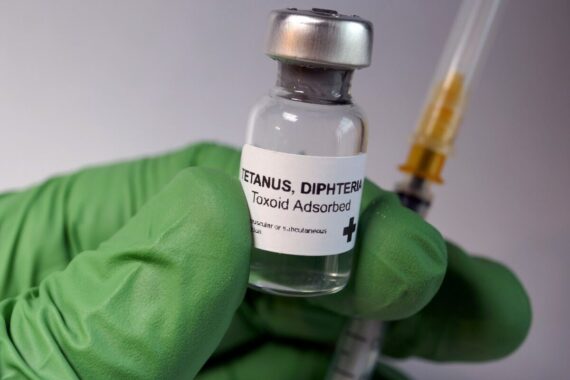There have been 62 cases of diphtheria this year among asylum seekers, a report from the UK Health Security Agency has confirmed.
In previous years the highest number of cases of the rare infection in England has been 11, the figures show.
The cases, which have been rising since June, have been largely identified in individuals newly arrived in the South East.
Mass antibiotic prophylaxis and vaccination have been recommended by public health teams for those in, or recently resident in, asylum seeker reception centres.
UKHSA said this approach had been put in place as there had been significant barriers to individual targeted case management and contact tracing.
It follows much attention on the Manston processing centre in Kent where 31-year-old Hussein Hasseb Ahmed who had diphtheria and died in hospital after arriving in the UK seven days earlier.
The highest number of new cases was reported in early November with 14 cases in one week but since then there has been between three and seven new cases a week, including five cases in the seven days up to 11 December.
In all 48 cases, which have mainly been seen in young men, were diagnosed in the South East with smaller numbers dotted around England, the figures suggest.
Two cases of severe respiratory diphtheria required hospitalisation and treatment with diphtheria anti-toxin and antibiotics, the UKHSA report said.
The increase in cases corresponds to a rise in diphtheria reported in Europe. Most of those affected has symptoms before arrival into the UK suggesting they had been infected on their journey through Europe or in their country of origin.
Gayatri Amirthalingam, UKHSA diphtheria incident director, said: ‘Whilst we continue to see diphtheria cases amongst asylum seekers, the risk of diphtheria to the wider public remains very low.
‘This is due to high uptake of the diphtheria vaccine in this country, and because the infection is typically passed on through close prolonged contact with a case.
‘In order to limit the risk of diphtheria being passed on within asylum seeker settings, UKHSA continues to recommend that individuals arriving at reception centres, and who have moved on recently, are offered a diphtheria vaccine and preventative treatment.’
Pulse July survey
Take our July 2025 survey to potentially win £1.000 worth of tokens












